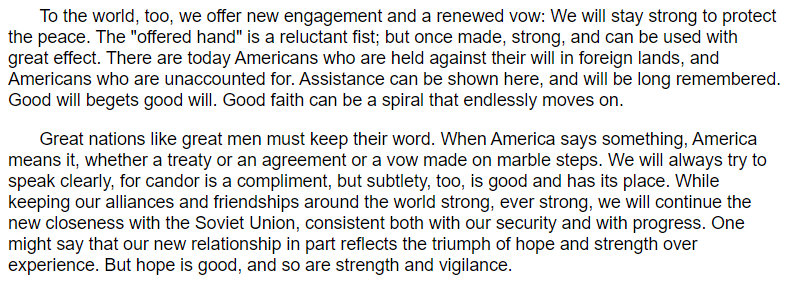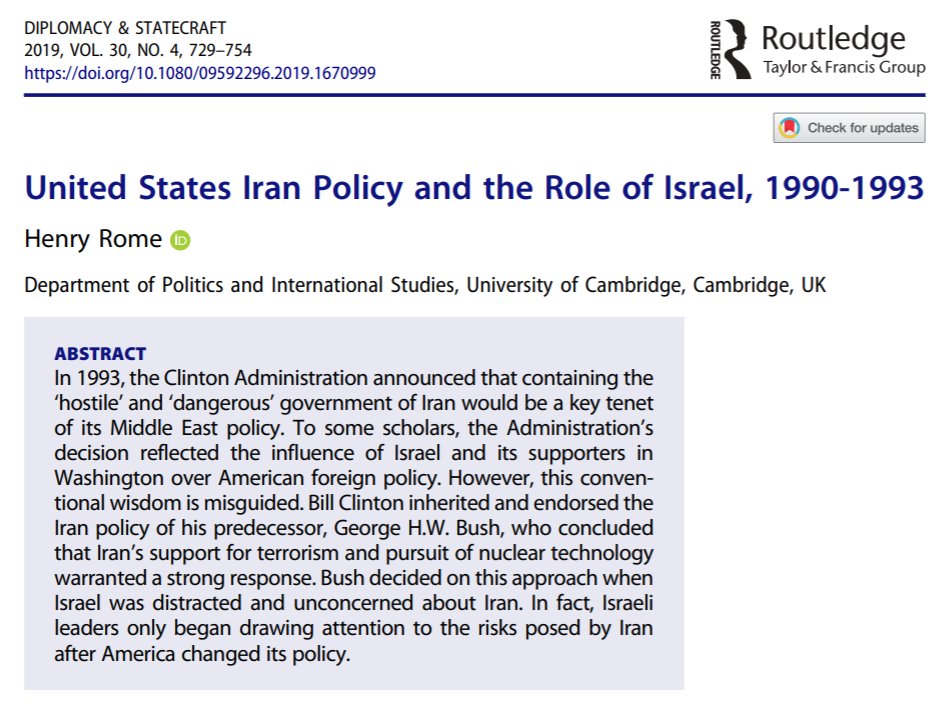Inauguration thread: With Joe Biden taking the oath of office tomorrow, what better time to think back 32 years to the inauguration speech of another seasoned former VP and the resounding (and often misunderstood) impacts on US policy toward Iran that linger to this day. 1/15

He signed a classified policy directive instructing US to "be prepared for a normal relationship with Iran" and authorized the beginning of indirect negotiations. 4/15
By the end of 1991, all Americans were freed from Lebanon. The US began to offer some promised "good will" in response. 5/15
It was a contradiction of Bush's inaugural pledge that left Rafsanjani out to dry. Why?
8/15
This included the March 1992 suicide attack on the Israeli embassy in Buenos Aires, carried out by Hezbollah. 9/15
The Bush administration pivoted to a much more forward-leaning posture toward Iran, which Clinton adopted in his "Dual Containment" policy. 13/15
https://t.co/pN6O5lOBHa
15/15

More from Biden
The hopes that QAnon will disappear with Biden’s inauguration will unfortunately be dashed.
Some followers will decamp. But a lot will be hardened.
How did we get here? What will happen? Why? And what can we do about it?
A🧵about cults & persuasion
Some followers will decamp. But a lot will be hardened.
How did we get here? What will happen? Why? And what can we do about it?
A🧵about cults & persuasion
A very personal thread about this story and why I increasingly believe addressing the rot caused by QAnon will be one of the Biden administration\u2019s most important and most difficult tasks. https://t.co/oe1jNGYG4R
— Lauren Camera (@laurenonthehill) January 17, 2021
You May Also Like
**Thread on Bravery of Sikhs**
(I am forced to do this due to continuous hounding of Sikh Extremists since yesterday)
Rani Jindan Kaur, wife of Maharaja Ranjit Singh had illegitimate relations with Lal Singh (PM of Ranjit Singh). Along with Lal Singh, she attacked Jammu, burnt - https://t.co/EfjAq59AyI

Hindu villages of Jasrota, caused rebellion in Jammu, attacked Kishtwar.
Ancestors of Raja Ranjit Singh, The Sansi Tribe used to give daughters as concubines to Jahangir.

The Ludhiana Political Agency (Later NW Fronties Prov) was formed by less than 4000 British soldiers who advanced from Delhi and reached Ludhiana, receiving submissions of all sikh chiefs along the way. The submission of the troops of Raja of Lahore (Ranjit Singh) at Ambala.
Dabistan a contemporary book on Sikh History tells us that Guru Hargobind broke Naina devi Idol Same source describes Guru Hargobind serving a eunuch
YarKhan. (ref was proudly shared by a sikh on twitter)
Gobind Singh followed Bahadur Shah to Deccan to fight for him.

In Zafarnama, Guru Gobind Singh states that the reason he was in conflict with the Hill Rajas was that while they were worshiping idols, while he was an idol-breaker.
And idiot Hindus place him along Maharana, Prithviraj and Shivaji as saviours of Dharma.

(I am forced to do this due to continuous hounding of Sikh Extremists since yesterday)
Rani Jindan Kaur, wife of Maharaja Ranjit Singh had illegitimate relations with Lal Singh (PM of Ranjit Singh). Along with Lal Singh, she attacked Jammu, burnt - https://t.co/EfjAq59AyI

Tomorrow again same thing happens bcoz fudus like you are creating a narrative oh Khalistan. when farmers are asking MSP. (RSS ki tatti khane wale Kerni sena ke kutte).
— Ancient Economist (@_stock_tips) December 5, 2020
U kill sikhs in 1984 just politics. To BC low IQ fudu Saale entire history was politics.
Hindu villages of Jasrota, caused rebellion in Jammu, attacked Kishtwar.
Ancestors of Raja Ranjit Singh, The Sansi Tribe used to give daughters as concubines to Jahangir.

The Ludhiana Political Agency (Later NW Fronties Prov) was formed by less than 4000 British soldiers who advanced from Delhi and reached Ludhiana, receiving submissions of all sikh chiefs along the way. The submission of the troops of Raja of Lahore (Ranjit Singh) at Ambala.
Dabistan a contemporary book on Sikh History tells us that Guru Hargobind broke Naina devi Idol Same source describes Guru Hargobind serving a eunuch
YarKhan. (ref was proudly shared by a sikh on twitter)
Gobind Singh followed Bahadur Shah to Deccan to fight for him.

In Zafarnama, Guru Gobind Singh states that the reason he was in conflict with the Hill Rajas was that while they were worshiping idols, while he was an idol-breaker.
And idiot Hindus place him along Maharana, Prithviraj and Shivaji as saviours of Dharma.
















